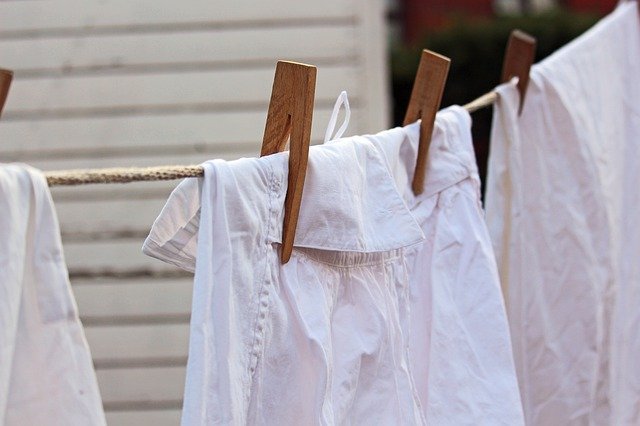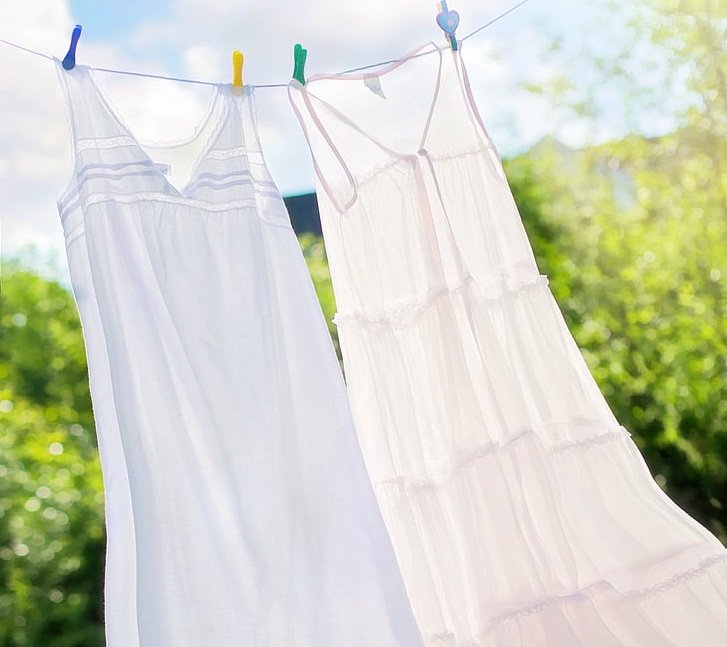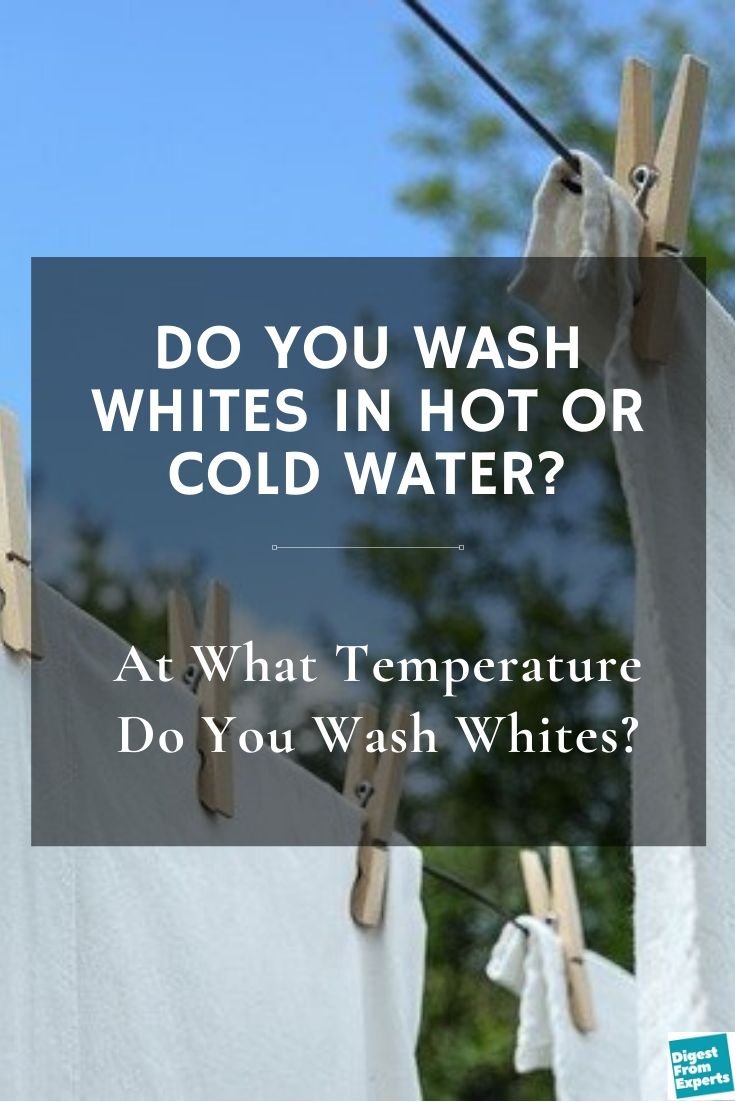The “white” load of laundry can make many people feel anxious or overwhelmed as it can be really hard to get white clothing looking new and fresh after use.
One common question we hear is “would it be better for me to wash my whites in hot or cold water?” It’s an understandable question! The temperature of the water you use in a washing cycle can make a big difference between getting your clothes sparkly fresh or ending up with a dull, faded looking wardrobe.
When it comes to keeping your whites looking new and bright, different washing methods may require different temperatures, so let’s see which is best for you!
Should you wash whites in hot or cold water?

The temperature of your water in a rinse or wash cycle can have different effects on the fabrics your clothes are made from and can reduce the brightness of whites.
Hot water is great for sanitizing white clothes and removing smells, but it can also set stains and dull white fabrics. On the other hand, Washing whites in cold water can preserve the brightness, but can also lower the effectiveness of detergents or cleansers, so may require more additives to get clothes completely clean.
Thus, meeting in the middle and washing with warm water can be a great way to utilize the sanitizing capabilities of hot water while still maintaining the brightness of white fabric and can be a good compromise for white clothes that have to be worn regularly (like as part of a uniform).
Washing White clothes in Hot Water Vs Cold Water (Various scenarios compared)

First, always check the label of your white clothes to make sure you’re following the manufacturer’s recommended instructions. But if you need a little fine-tuning or have lost the tag, here are some recommendations based on fabric, the method of washing, and the type of stains on your white clothing:
Water Temperatures wrt The Fabric of White Clothes
Unfortunately, the outcome of your laundry routine can be affected based on the type of fabric your white clothes are made from, so it’s always best to check the tag from the manufacturer.
- Natural materials like cotton, wool, or silk look their best and have longer use when washed in cold water.
- On the other hand, materials that are manufactured, like polyester, rayon, or nylon won’t get clean without the help of hot water, (though excessive washing can dull bright whites so try to use hot water sparingly).
Water Temperatures wrt The Method of Washing Your Whites
- Hand washing – If you’ll be hand washing delicates or bright white clothes using a scrub brush or by rubbing them with your hands, it can agitate the fabric. Thus, instead, let it just soak, then warm water with a little bit (around 1tsp) of detergent or soap.
- Washing machines – Most washing machines now have preset settings that auto-adjust the temperature based on the type of fabric. A washing machine will normally default to a warm water temperature setting for both white and dark clothes, but if you need to change the default settings, opt for cold water for used-but-clean whites and hot water for stained or heavily soiled whites.
- Soaking – Use cold water to pre-soak a piece of soiled fabric or a clothing item that is delicate. Soaking stained white clothing can take a while, though, so use a sink or bucket that can be left overnight.
Water Temperatures wrt The Type of Stains on your White clothing
- Stain removal (fresh stains) – If you’re pre-treating a stain before a washing cycle on a piece of white clothing, then the temperature will depend on the type of stain. Cold water should be used for most liquid stains or makeup, but hot water is best for stains that are oily (things like butter, salad dressings, or face serums). Hot water is particularly helpful if your clothes are made from man-made materials like polyester or rayon.
- Stain removal (old stains) – For stains that have been around a while and have set into the fabric, your best solution to remove it from light or white clothing is to use a stain-fighting agent like a commercial stain removing spray or lemon juice (which is great for brightening white fabrics) and soak the piece in cold water for a few hours (though it may take as much as 24 hours depending on the age and severity). Hot water will make it more difficult to remove, even if it’s an oil-based stain.
At what temperature should you wash Whites?
If you’re looking to ensure your whites end up remaining bright and new looking, cold water should range 60F – 80F (16C – 26.7C) with an ideal temperature of 75F (23.8C). If you need to utilize hot water, be sure to go no higher than 150F (65.5C), otherwise, you may begin to see thinning of the fabric fibers and dulling of bright white hues.
If you have pieces of white clothing that need to be washed regularly, try to utilize warm water at a range of 90F – 110F (32.2C – 43.3C). You can check the temperatures by using a kitchen thermometer by dipping it in the water and holding for a few seconds, then remove the thermometer and check the numbers on the side.
What If I Use Detergents or Additives?
Heavily concentrated additives like bleach or fabric softener will be fine in either hot or cold water since they need to be diluted before use anyhow. Detergents and soaps, however, will lose their effectiveness in water temperatures that are 60 degrees Fahrenheit or below, so it’s best to use cleaning agents only in warm or hot water.
There are, however, specially-made cleaning agents like Woolite that are designed for use in cold water soaks and rinses, so if you want to avoid hot water completely but still need to make sure your white clothes are clean and bright, there are still ways to make it happen.
Conclusion
In most cases, cold water is going to be your best bet when it comes to washing your white or light clothing, but keep in mind that different variables like the level of staining, how long the clothing has been soiled, and the type of material can either boost or lower the effectiveness of a cold water cycle on dirty laundry.

Megan Brame-Finkelstein is an award-winning entrepreneur, podcaster and journalist who lives in Rochester, United States. She completed her Bachelors Degree in Social Sciences at the University of Pittsburgh and also worked as a Director of Marketing and Communications at ER select for almost 2 years. She is a Muckrack listed journalist and contributed to some of the top publications and Magazines online. Some of her top works are published on Huffington Post, Good Housekeeping, Elite Daily and the New York Times. Megan Brame loves clothes, fashion, and hot coffee.
